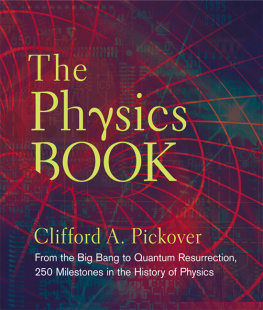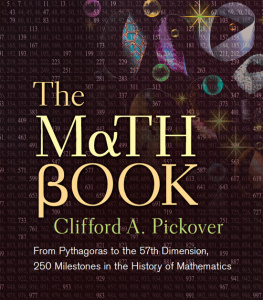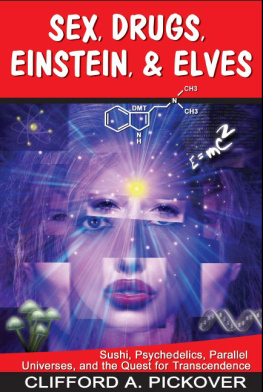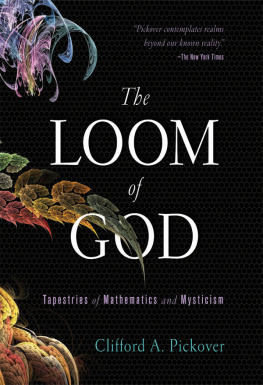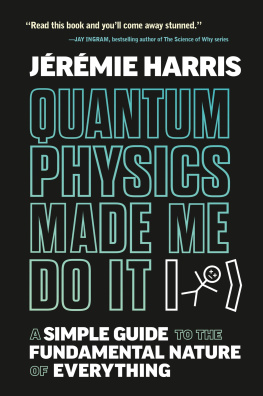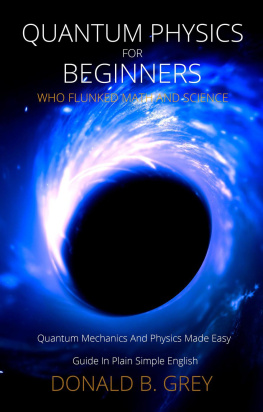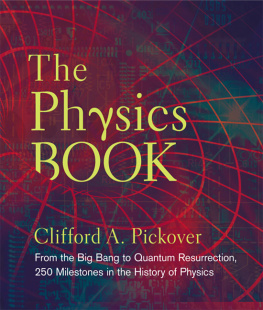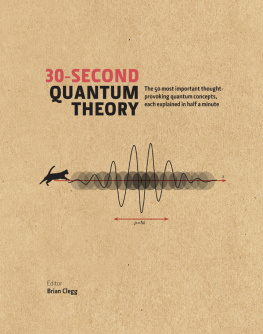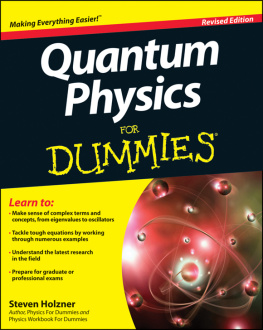
Books by Clifford A. Pickover
The Alien IQ Test
Archimedes to Hawking
A Beginners Guide to Immortality
Black Holes: A Travelers Guide
Calculus and Pizza
Chaos and Fractals
Chaos in Wonderland
Computers, Pattern, Chaos, and Beauty
Computers and the Imagination
Cryptorunes: Codes and Secret Writing
Dreaming the Future
Egg Drop Soup
Future Health
Fractal Horizons: The Future Use of Fractals
Frontiers of Scientific Visualization
The Girl Who Gave Birth to Rabbits
The Heaven Virus
Jews in Hyperspace
Keys to Infinity
Liquid Earth
The Lobotomy Club
The Loom of God
The Mathematics of Oz
The Math Book
Mazes for the Mind: Computers and the Unexpected
Mind-Bending Visual Puzzles (calendars and card sets)
The Mbius Strip
The Paradox of God and the Science of Omniscience
A Passion for Mathematics
The Pattern Book: Fractals, Art, and Nature
The Science of Aliens
Sex, Drugs, Einstein, and Elves
Spider Legs (with Piers Anthony)
Spiral Symmetry (with Istvan Hargittai)
Strange Brains and Genius
Sushi Never Sleeps
The Stars of Heaven
Surfing through Hyperspace
Time: A Travelers Guide
Visions of the Future
Visualizing Biological Information
Wonders of Numbers
THE
PHYSICS
BOOK
FROM THE BIG BANG TO QUANTUM RESURRECTION, 250 MILESTONES IN THE HISTORY OF PHYSICS
Clifford A. Pickover


An Imprint of Sterling Publishing
387 Park Avenue South
New York, NY 10016
STERLING and the distinctive Sterling logo are registered trademarks of Sterling Publishing Co., Inc.
2011 by Clifford A. Pickover
All rights reserved. No part of this publication may be reproduced, stored in a retrieval system, or transmitted, in any form or by any means, electronic, mechanical, photocopying, recording, or otherwise, without prior written permission from the publisher.
ISBN 978-1-4027-7861-2 (hardcover)
ISBN 978-1-4027-9099-7 (ebook)
Library of Congress Cataloging-in-Publication Data
Pickover, Clifford A.
The physics book : from the Big Bang to Quantum Resurrection,
250 milestones in the history of physics / Clifford A. Pickover.
p. cm.
Includes bibliographical references and index.
ISBN 978-1-4027-7861-2 (alk. paper)
1. PhysicsHistory. I. Title.
QC7.P49 2011
530.09dc22
2010051365
For information about custom editions, special sales, and premium and corporate purchases, please contact Sterling Special Sales at 800-805-5489 or specialsales@sterlingpublishing.com.
2 4 6 8 10 9 7 5 3 1
www.sterlingpublishing.com
We all use physics every day. When we look in a mirror, or put on a pair of glasses, we are using the physics of optics. When we set our alarm clocks, we track time; when we follow a map, we navigate geometric space. Our mobile phones connect us via invisible electromagnetic threads to satellites orbiting overhead. But physics is not all about technology. Even the blood flowing through arteries follows laws of physics, the science of our physical world.
Joanne Baker, 50 Physics Ideas You Really Need to Know
The great equations of modern physics are a permanent part of scientific knowledge, which may outlast even the beautiful cathedrals of earlier ages.
Steven Weinberg, in Graham Farmelos It Must Be Beautiful

The Scope of Physics
As the island of knowledge grows, the surface that makes contact with mystery expands. When major theories are overturned, what we thought was certain knowledge gives way, and knowledge touches upon mystery differently. This newly uncovered mystery may be humbling and unsettling, but it is the cost of truth. Creative scientists, philosophers, and poets thrive at this shoreline.
W. Mark Richardson, A Skeptics Sense of Wonder, Science
The American Physical Society, todays leading professional organization of physicists, was founded in 1899, when 36 physicists gathered at Columbia University with a mission to advance and disseminate knowledge of physics. According to the society:
Physics is crucial to understanding the world around us, the world inside us, and the world beyond us. It is the most basic and fundamental science. Physics challenges our imaginations with concepts like relativity and string theory, and it leads to great discoveries, like computers and lasers, that change our lives. Physics encompasses the study of the universe from the largest galaxies to the smallest subatomic particles. Moreover, its the basis of many other sciences, including chemistry, oceanography, seismology, and astronomy.
Indeed, today physicists roam far and wide, studying an awesome variety of topics and fundamental laws in order to understand the behavior of nature, the universe, and the very fabric of reality. Physicists ponder multiple dimensions, parallel universes, and the possibilities of wormholes connecting different regions of space and time. As suggested by the American Physical Society, the discoveries of physicists often lead to new technologies and even change our philosophies and the way we look at the world. For example, for many scientists, the Heisenberg Uncertainty Principle asserts that the physical universe literally does not exist in a determinist form, but is rather a mysterious collection of probabilities. Advances in the understanding of electromagnetism led to the invention of the radio, television, and computers. Understanding of thermodynamics led to the invention of the car.
As will become apparent as you peruse this book, the precise scope of physics has not been fixed through the ages, nor is it easily delimited. I have taken a rather wide view and have included topics that touch on engineering and applied physics, advances in our understanding of astronomical objects, and even a few topics that are quite philosophical. Despite this large scope, most areas of physics have in common a strong reliance on mathematical tools to aid scientists in their understandings, experiments, and predictions about the natural world.
Albert Einstein once suggested that the most incomprehensible thing about the world is that it is comprehensible. Indeed, we appear to live in a cosmos that can be described or approximated by compact mathematical expressions and physical laws. However, beyond discovering these laws of nature, physicists often delve into some of the most profound and mind-boggling concepts that humans have ever contemplatedtopics ranging from relativity and quantum mechanics to string theory and the nature of the Big Bang. Quantum mechanics gives us a glimpse of a world that is so strangely counterintuitive that it raises questions about space, time, information, and cause and effect. However, despite the mysterious implications of quantum mechanics, this field of study is applied in numerous fields and in technologies that include the laser, the transistor, the microchip, and magnetic resonance imaging.

